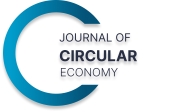Enabling Mechanisms for Circularity in Latin America and the Caribbean
Abstract
Within Latin America’s strategic importance in the global value chain, circular economy strategies emerge as pivotal pathways for the region. By identifying key enabling mechanisms (namely regulatory frameworks, assessing and monitoring socio-economic metabolism, and financial instruments), this paper unveils the imperative for actions in fostering a circularity transition, and preserving traditional circular economy practices for Latin American and the Caribbean countries in the upcoming decade.
DOI: https://doi.org/10.55845/IKHI7118
References
Aguilar-Hernandez, G. A., Sigüenza-Sanchez, C. P., Donati, F., Merciai, S., Schmidt, J., Rodrigues, J. F. D., & Tukker, A. (2019). The circularity gap of nations: A multiregional analysis of waste generation, recovery, and stock depletion in 2011. Resources, Conservation and Recycling, 151. https://doi.org/10.1016/j.resconrec.2019.104452
Circle Economy. (2023). The Circularity Gap Report – Latin America and the Caribbean. https://www.circularity-gap.world/lac
Circular Economy Coalition Latin America & Caribbean. (2022). Circular Economy in Latin America and the Caribbean: A Shared Vision. https://coalicioneconomiacircular.org/en/economia-circular-en-america-latina-y-el-caribe-una-vision-compartida/
Circular Economy Coalition Latin America & Caribbean. (2024). Members. https://coalicioneconomiacircular.org/en/our-network/
Cook, E., Silva de Souza Lima Cano, N., & Velis, C. A. (2024). Informal recycling sector contribution to plastic pollution mitigation: A systematic scoping review and quantitative analysis of prevalence and productivity. Resources, Conservation and Recycling, 206, 107588. https://doi.org/10.1016/j.resconrec.2024.107588
DANE. (2024). Indicadores Economía Circular – Colombia. https://www.dane.gov.co/index.php/estadisticas-por-tema/ambientales/economia-circular
Dini, M., & Stumpo, G. (2020). Mipymes en América Latina: un frágil desempeño y nuevos desafíos para las políticas de fomento. https://www.cepal.org/es/publicaciones/44148-mipymes-america-latina-un-fragil-desempeno-nuevos-desafios-politicas-fomento
Federal Government of Mexico. (2023). Decreto por el que se reforman y adicionan diversas disposiciones de la Ley General para la Prevención y Gestión Integral de los Residuos. https://www.diputados.gob.mx/LeyesBiblio/ref/lgpgir.htm
Fitch-Roy, O., Benson, D., & Monciardini, D. (2021). All around the world: Assessing optimality in comparative circular economy policy packages. Journal of Cleaner Production, 286. https://doi.org/10.1016/j.jclepro.2020.125493
Girett, A., Wassenaar, T., & Pabon-Pereira, C. (2023). Assessing nutrient circularity capacity in South American metropolitan areas. Resources, Conservation and Recycling, 197, 107085. https://doi.org/10.1016/j.resconrec.2023.107085
Government of Chile. (2016). Ley 20920. Establece marco para la gestión de residuos, la responsabilidad extendida del productor y fomento al reciclaje. https://www.bcn.cl/leychile/navegar?idNorma=1090894
Government of Chile. (2021). Ley 21368. Regula la entrega de plásticos de un solo uso y las botellas plásticas. . https://www.bcn.cl/leychile/navegar?idNorma=1163603
Herrera, D. (2020). MSME Financing Instruments in Latin America and the Caribbean During COVID-19. https://doi.org/10.18235/0002361
IDB. (2023). Unlocking Circular Economy Finance in Latin America and the Caribbean: The Catalyst for a Positive Change Findings and recommendations for Policymakers and the Financial Sector. https://www.unepfi.org/publications/unlocking-circular-economy-finance-in-latin-america-and-the-caribbean-the-catalyst-for-a-positive-change/
Kahhat, R., Miller, T. R., Ojeda-Benitez, S., Cruz-Sotelo, S. E., Jauregui-Sesma, J., & Gusukuma, M. (2022). Proposal for used electronic products management in Mexicali. Resources, Conservation & Recycling Advances, 13, 200065. https://doi.org/10.1016/j.rcradv.2022.200065
Kahhat, R., & Williams, E. (2009). Product or Waste? Importation and End-of-Life Processing of Computers in Peru. Environmental Science & Technology, 43(15), 6010–6016. https://doi.org/10.1021/es8035835
Mayer, A., Haas, W., Wiedenhofer, D., Nuss, P., & Blengini, G. A. (2018). Measuring Progress towards a Circular Economy A Monitoring Framework for Economy-wide Material Loop Closing in the EU28. Journal of Industrial Ecology, 00(0), 1–15. https://doi.org/10.1111/jiec.12809
MINAE. (2023). Estrategia National Economía Circular. https://minae.go.cr/ver/documentos/archivos/Estrategia%20Nacional%20de%20Economia%20Circular%20CR.pdf
Núñez, G., Velloso, H., & Da Silva, F. (2022). Corporate governance in Latin America and the Caribbean: using ESG debt instruments to finance sustainable investment projects. https://hdl.handle.net/11362/47778
OECD. (2019). Latin America and the Caribbean 2019 – Policies for Competitive SMEs in the Pacific Alliance and Participating South American countries. https://doi.org/10.1787/d9e1e5f0-en
OECD. (2022). Climate finance in LAC: the international commitments and private finance mobilisation. https://www.oecd.org/greengrowth/2RPD_Background%20Note_Day2.pdf
Pabón-Pereira, C., & Mora, A. (2023). El Rol de las MiPymes Gestoras de Residuos en la Economía Circular de la Región de Los Lagos, Chile. Estudio de caso elaborado para UNEP, Circle Economy, ASCC-Chile. https://ascc.cl/resources/uploads/documentos/estudio_de_caso_gestio%CC%81n_de_residuos_en_la_region_de_los_lagos.pdf
Park, J., Díaz-Posada, N., & Mejía-Dugand, S. (2018). Challenges in implementing the extended producer responsibility in an emerging economy: The end-of-life tire management in Colombia. Journal of Cleaner Production, 189, 754–762. https://doi.org/10.1016/j.jclepro.2018.04.058
Samaniego, J., Rondón Toro, E., Herrera Jiménez, J., & Santori, S. (2022). Panorama de las hojas de ruta de economía circular en América Latina y el Caribe. Documentos de Proyectos. https://www.cepal.org/es/publicaciones/48632-panorama-hojas-ruta-economia-circular-america-latina-caribe
Schröder, P., & Raes, J. (2021). Financing an inclusive circular economy:De-risking investments for circular business models and the SDGs. https://www.chathamhouse.org/sites/default/files/2021-07/2021-07-16-inclusive-circular-economy-schroder-raes.pdf
Teixeira, A. A., Moraes, T. E. D. C., Stefanelli, N. O., de Oliveira, J. H. C., Teixeira, T. B., & de Souza Freitas, W. R. (2020). Green supply chain management in Latin America: Systematic literature review and future directions. Environmental Quality Management, 30(2), 47-73, 30(2), 47–73. https://doi.org/https://doi.org/10.1002/tqem.21712
UNSD. (2024). Countries or areas/geographical regions. https://unstats.un.org/unsd/methodology/m49/
How to Cite This Article
Copyright
Open Access: This article is licensed under a Creative Commons Attribution 4.0 International License, which permits use, sharing, adaptation, distribution and reproduction in any medium or format, as long as you give appropriate credit to the original author(s) and the source, provide a link to the Creative Commons licence, and indicate if changes were made. The images or other third-party material in this article are included in the article’s Creative Commons licence, unless indicated otherwise in a credit line to the material. If material is not included in the article’s Creative Commons licence and your intended use is not permitted by statutory regulation or exceeds the permitted use, you will need to obtain permission directly from the copyright holder. To view a copy of this licence, visit http://creativecommons.org/licenses/by/4.0/.
Author Notes
Glenn A. Aguilar-Hernandez[1][2]*, Bart Van Hoof [3], Álvaro Conde[4], Ramzy Kahhat[5], Claudia Pabón-Pereira[6]
[1] Institute of Environmental Sciences (CML), Leiden University
[2] Academia de Centroamérica
[3] School of Management, Universidad de los Andes
[4] Circle Economy
[5] Peruvian LCA Network, Department of Engineering, Pontificia Universidad Católica del Perú
[6] Facultad de Economía y Administración e Instituto de Desarrollo Sustentable. Pontificia Universidad Católica de Chile
*Corresponding author: [email protected]
Published Details: Received: 07.05.2024 / Accepted: 17.07.2024 / Published: 22.08.2024
